A new restaurant is coming to 5th & Florida
A new restaurant is coming to the short-lived hair salon (pictured right) at 5th Street and Florida Avenue NW. From Paul Carlson, the owner of Vinoteca, comes The Royal, named for the Royal liquor store that once occupied the building many, many years ago.
Mr. Carlson described his forthcoming 40-seat restaurant as a place “where people can stop by on their way home, the price points are lower, and people know each other and know the staff.”
Though Mr. Carlson doesn’t expect the Royal to open for a few months, interested neighbors are invited to visit on Sunday, January 26, from 2pm to 4pm. If you can’t make it on Sunday, come hear Mr. Carlson’s presentation at Tuesday‘s civic association meeting. The association will likely vote on the Royal’s request for an alcohol license.
City grants license for All Souls, slams opponents
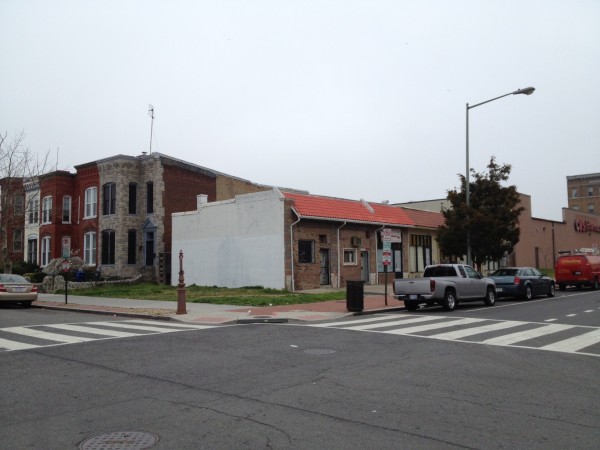
The Alcoholic Beverage Control (ABC) Board will grant a license for All Souls, the proposed restaurant to occupy the long-vacant storefront at 725 T Street. All Souls became a lightning rod for unexpected opposition in March, drawing crowds and TV news coverage to its liquor license hearing. The objections covered the usual grounds: too much noise late into the night, too many drivers looking for parking, too many chances for general disorder.
The proprietor had long before agreed to only serve alcohol inside and only serve after 5 pm.
The most unusual objection, however, was that it is harmful for children to look across the street and view adults consuming alcohol. The objection seemed like a quaint, Puritanical reaction incongruent with a diverse, secular city.
DC law does, however, recognize that alcohol-serving establishments near schools merit at least some level of extra scrutiny. In fact the law prohibits the issuance of liquor licenses
within 400 feet of a public, private, or parochial primary, elementary, or high school; college or university; or recreation area operated by the District of Columbia Department of Parks and Recreation (DC Code §25-314(b)(1)).
The protestors, legally referred to as “protestants”, thought this provision would damn the All Souls application. The same section of the DC Code, however, lists 10 exceptions to the 400-foot rule, including this important one:
The 400-foot restriction shall not apply if there exists within 400 feet a currently-functioning establishment holding a license of the same class at the time that the new application is submitted. (DC Code §25-314(b)(3))
The board found that the Mesobe market in the orange building at 1853 7th Street NW is indeed already within 400 feet of the school. The distance measurement, the board’s ruling stated, “‘shall be the shortest distance between the property lines of the places.’ 23 DCMR §101.1 (West Supp. 2012).”
The existence of Mesobe within 400 feet of the school provides a precedent that satisfies the exception for All Souls, the board decided.
With that argument down, the board addressed the general assertion that it is unsafe for children to view adults consuming alcohol. Here is where the board delivered its most scathing criticism of the objectors:
Finally, we reject the Protestants’ unsubstantiated assertion that the mere sight of the Applicant’s tavern will be detrimental to the students of Cleveland Elementary School… Indeed, if we accepted the Protestants’ argument that the mere sight of adults in a tavern consuming alcohol is harmful to children, the Board would similarly have to ban children from:
- entering restaurants that serve alcohol to patrons;
- attending sporting events where alcohol may be consumed by adult fans;
- eating dinner with their parents if wine is served with the parents’ meal;
- participating in religious ceremonies where wine is part of the service; and
- walking through neighborhoods with large concentrations of liquor-serving establishments during the daytime, such as Adams Morgan and U Street.
The board further described the objection as “unworkable, unreasonable, and not in accordance with current societal practices.”
There are a few important lessons from this case. The most important is that District boards don’t always cave to the flimsily argued demands of a vocal few. A common complaint, especially among the business community, is that DC’s various boards, such as Zoning Commission, the Board of Zoning Adjustment, the Historic Preservation Review Board (HPRB), the Old Georgetown Board, the ABC Board, etc., exercise their discretion in ways that are too often inconsistent or outright bizarre.
The most frustrating experience with these boards is encountering unsupported opinions. In cases before the HPRB, many opponents argue that a proposed building is “incompatible” with the historic district while they fail to elaborate why it is allegedly incompatible. Georgetown resident Topher Matthews explained this sentiment that I have also encountered when following historic preservation cases:
Time and time again, neighbors use the historic preservation design review process to object to the size of the project rarely out of any genuine concern for the preservation of the neighborhood’s historic character but rather because they simply just don’t like the project. The basis for the complaints would be no different than if the project were in a brand new development with no historic character: it blocks my view, it’s too big, you’ll be able to see into my garden, et cetera.
In the All Souls case, the school proximity argument failed to establish harm to students to a degree that would warrant killing off a local business. It is a non sequitur to many people that children are harmed by catching a glimpse of adults across the street sipping wine at 5 pm. Merely believing that something is true doesn’t necessarily make it true. In rejecting this claim, the ABC Board made the right decision.
The entire licensing process, which was unusually protracted in this case, certainly cost the proprietor of All Souls a hefty sum in legal fees. When the proprietor attended community meetings on his proposed license, he usually had his attorney with him to address the fine legal distinctions, especially as it applied to the somewhat complicated 400-foot rule.
In fact I pitied the man. All he wanted to do was open up his small businesses. His modest license request unleashed the histrionic vitriol of a few strident Furies who spoke as though he were defiling the sanctity of childhood itself!
The board ratified a voluntary agreement between All Souls and three neighbors uninvolved in the school-proximity protest. The text of this side agreement is not currently available, but if it is like most other voluntary agreements, it likely negotiated closing hours and restrictions on indoor music volume, not moral arguments about child psychology and societal vice.
The good news is that even the school-proximity opponents who lost their case actually won. Cleveland Elementary School is a great school and will continue to be a great school long after All Souls has poured its inaugural beer. The conversion of the vacant storefront into an occupied business will deter the loitering and drug dealing along that block of T Street and will remove a visible physical blight from the neighborhood.
The neighborhood and the school will both be better off once All Souls opens.
A moratorium will stifle new restaurants and lower service
We recently received a petition to oppose a liquor license moratorium for the U Street area. We weren’t sure why the petition came up, but it seems there is yet another movement afoot to establish a liquor license moratorium (and thus a restaurant moratorium) on U Street. The moratorium’s backer is a resident on 13th Street and she proposes the moratorium for all new liquor license applications within a 1,800-foot radius of Ben’s Next Door.
We wrote about this matter two years ago when Jim Graham floated the idea. Nonetheless, it’s worth revisiting why this moratorium is a bad idea:
It makes no distinction between responsible businesses and rowdy businesses.
A moratorium fails to differentiate between businesses that are quiet and cause no trouble for their neighbors, e.g. the Saloon, and those that cause raucous noise late into the night. ANCs and neighbors should protest irresponsible and disruptive businesses, but a moratorium is essentially a permanent, unconditional protest of all proposed restaurants and bars. Many new establishments are started by experienced restaurateurs whose previous businesses exist in harmony with their neighbors.
It’s effectively a restaurant moratorium.
Restaurants make their money on alcohol and relatively little on food. This is why Shaw’s Tavern, when dry, quickly shuttered. Prohibiting the issuance of new liquor licenses will essentially deny new restaurants the ability to earn enough to pay rent. A liquor license moratorium is a restaurant moratorium.
It will reduce customer service.
A moratorium will limit the supply of restaurants and bars even while demand rises. This means restaurant prices will face upward pressure, seating may become scarcer, and service quality will likely fall. The population of the census tract covering the eastern side of the U Street corridor grew by 86% from 2000 to 2010 and will continue to grow as more residential buildings come online. If you think finding a table is hard now, a moratorium will make it worse.
It unfairly “picks winners”.
Placing a legislative cap on new business activity unfairly privileges incumbent businesses. To intervene so severely in the market as to artificially limit consumer choice means that current license holders will enjoy an oligopoly. This increased business, however, will not result from a restaurant’s merit, but will result from the fact that consumers will face limited choices. A business owner’s “merit” will simply be that he had the good luck open shop just before the regulatory door slammed shut behind him.
It’s arbitrary.
There are currently 107 licenses within the proposed moratorium area. There is no definitive proof that the 107 number is too high, too low, or just right. Unfortunately, moratoria disregard nuance and set arbitrary numbers as permanent limits.
Furthermore, it’s arbitrary to propose that the moratorium be based on a perfect circle, that the circle have a 1,800-foot radius, and that the circle be centered on Ben’s Next Door.
It will not resolve the stated problem.
Matters of crime, noise, and trash, which the City Paper reports as the main motivators for the moratorium’s proponent, will not be resolved by a moratorium. Restricting the issuance of alcohol licenses will not reduce crime, will not reduce noise, and will not reduce trash. It will, however, result in longer wait times for table, higher prices, and lower service.
It’s difficult to administer.
Laws should be simple to understand and administer. The proposed moratorium area is a circle and circles are harder to measure on land. In fact, we discovered this problem recently when measuring the distance between a liquor store and Cleveland Elementary School. Do you measure by the edge of the property line or by the edge or the building? Certainly we have the technology today to determine this distance, but it takes time and skill to do it accurately. The technical challenge is a hurdle for business owners and citizens alike to understand the impact of the law. A listing of city blocks would be far easier to decipher and would cause less confusion than a circle.
* * *
Instead of swinging a legal sledgehammer to stop all future restaurants, good and bad, we should judge each application on its own merit. Restaurateurs who have proven records of being good neighbors should by all means receive licenses and less reputable restaurateurs should be denied. We urge you to sign the petition to oppose the moratorium.
Shaw’s Tavern dry no more
Shaw’s Tavern finally got its alcohol license approved and will open tonight for dinner. For this weekend they are only serving beer and wine.
If you’re curious, you might want to read our recent review of Shaw’s or see what the building looked like in 1937.
Here are the new hours:
Kitchen:
Monday – Thursday: Lunch 10am-3pm, Dinner 5pm-10pm
Friday: Lunch10am-3pm, Dinner 5pm-11am
Saturday: Brunch 9am- 3pm, Dinner 5pm-11pm
Sunday: Brunch 9am-3pm, Dinner 5pm-10pm
Bar:
Monday- Thursday: 10:00am-12:30am
Friday: 10:00am-2:30am
Saturday: 9:00am-2:30am
Sunday: 9am-12:00am
Vocal opponents try to quash a new area restaurant

Few things rile up neighbors like liquor licenses. Just outside LeDroit Park at 8th and T Streets, a proposal for a new restaurant, All Souls, has elicited the ire of several neighbors. The objectors, though small in number, are trying to stop a local restaurateur from turning a vacant storefront, pictured above, into a community asset. Much of this opposition is unwise and unwarranted and will hold back neighborhood improvement. We have heard the objections to All Souls for several months and would like to see this restaurant finally come to fruition.
While some objections, particularly regarding outdoor noise late into the night, are certainly reasonable, a few objectors have damaged their own credibility with an array of spurious objections.
The first of such complaints is that a restaurant serving alcohol across the street from an elementary school is unsavory. This is a red herring. Restaurants cannot serve alcohol to 10-year-olds and the main business of restaurants is at night, several hours after school has ended. The restaurateur has agreed to not serve alcohol before 5 pm.
The most ludicrous objection we heard is that patrons on the patio on 8th Street (along the blank wall in the photo above) will leer into a neighboring house. This is another red herring as drawing one’s window blinds or curtains can easily solve this problem.
Another objection is that a restaurant is inappropriate for what one objector alleged is a “residential street”. This is not entirely true. Most of the 1900 block of 8th Street is actually in a commercial zone C-2-B, which is intended for commercial uses, but also allows residential uses.
The restaurant site is surrounded by a residential zone (R-4) on three sides. Nonetheless, all zones have boundaries in which differing uses abut each other. It is the responsibility of residents to research and understand the zoning implications of where they live. It is also important for residents to understand their limitations in dictating how other people lawfully use their own property.
The restaurant building, as marked in the map below, is zoned for commercial uses (C-2-A), which permits restaurants as a matter of right. The law is very clear in this case that a restaurant is permitted in this location. The issuance of the alcohol license, which is necessary for any reastaurant to survive financially, is not by right, but must be requested. Thus, it is only in the alcohol license that the objectors have a viable case to block the business.
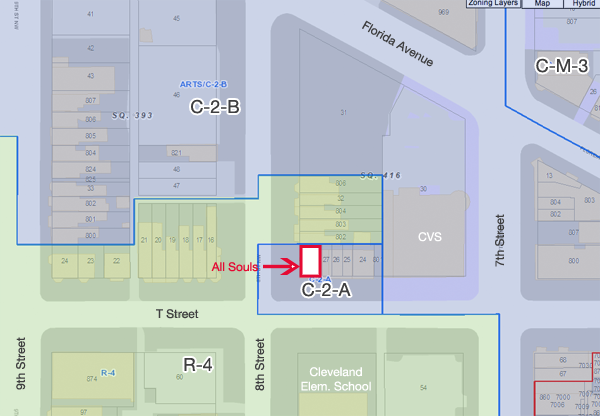
All Souls will improve the quality of life in several ways. It will provide a sit-down restaurant, something we consider a desirable neighborhood amenity. It will provide more eyes on the street to deter crime. Drug dealers and criminals at 7th & T Streets will feel less confident in their criminality when they see that there are numerous witnesses at sidewalk tables 100 feet away.
 Most importantly, the conversion of a vacant property (pictured to the right) into a vibrant, occupied use improves the impression of the neighborhood. People rightly look upon vacant and abandoned space negatively. They look at active, lively restaurants positively. All Souls will improve the image of the neighborhood by improving the quality of life.
Most importantly, the conversion of a vacant property (pictured to the right) into a vibrant, occupied use improves the impression of the neighborhood. People rightly look upon vacant and abandoned space negatively. They look at active, lively restaurants positively. All Souls will improve the image of the neighborhood by improving the quality of life.
Let’s hope the unreasonable objections of a few don’t derail a potential community asset that we suspect the silent majority supports.
Liquor violation keeps Shaw’s Tavern dry
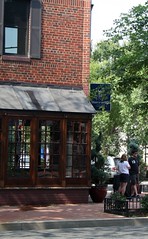 The much-anticipated Shaw’s Tavern at Florida Avenue and 6th Street finally opened on Friday, July 29. The restaurant, whose food neighbors have praised, is not serving alcohol, due to the fact they likely violated the District liquor laws before they even opened.
The much-anticipated Shaw’s Tavern at Florida Avenue and 6th Street finally opened on Friday, July 29. The restaurant, whose food neighbors have praised, is not serving alcohol, due to the fact they likely violated the District liquor laws before they even opened.
The City Paper reports that the restaurant, before it opened, hosted a private fundraiser for a local charity. The Alcoholic Beverage Regulation Administration (ABRA), which enforces the city’s liquor laws, accuses the restaurant of serving alcohol without a license during the event. Restaurants, bars, and other places of public accommodations, must have licenses to serve alcohol.
The restaurant contends that because it had not yet opened to the public, it was not “operating” and thus logically could not operate without a license.
Whatever the case, we hope Shaw’s will obtain its license soon. The culinary photos they post on Facebook would look even more delicious if paired with wine or beer.
While we welcome new restaurants to the area and appreciate the owners’ pricey investment renovating the property, it is important to uphold the rule of law and not excuse violations. Certainly any punishment should fit the severity of the crime, but to excuse some businesses while punishing others for the same violation is unfair.
U Street Booze Moratorium
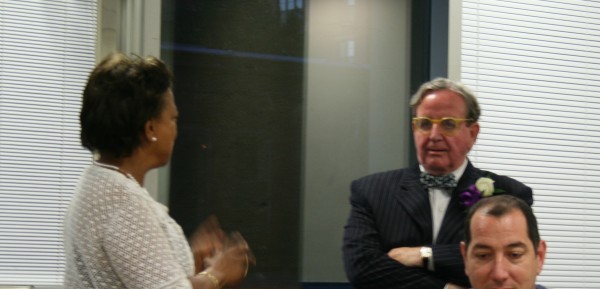
At last night’s monthly meeting of ANC1B, Councilmember Jim Graham (D – Ward 1) suggested that the neighborhood could “benefit from discussion” of a liquor license moratorium on U Street. While the U Street corridor has experienced significant growth in the number of restaurants and bars over the past ten years, not everyone is happy with the revival. The bar scene, in the midst of a dense neighborhood is bound to create conflict especially as the corridor becomes a regional destination for bar-goers.
In fact one of the attractive features of U Street is that its bars have not become as raucous and overcrowded as those in Adams-Morgan. Part of the reason is that U Street attracts a different crowd (read: fewer college students) and includes more restaurants than actual bars. Furthermore, U Street stretches 0.8 miles (from Ninth to Seventeenth Streets) compared to Adams-Morgan’s 0.4 mi (along Eighteenth Street from U Street to Columbia Road). In reality the main bar strip of Adams-Morgan is packed into the 0.2 miles between Kalorama and Columbia Roads. That’s only one-fourth the length of the U Street corridor.

We know Adams-Morgan and U Street is no Adams-Morgan.
A moratorium on U Street would freeze the supply of available bar and restaurant space without alleviating the demand. In other words, a moratorium would eventually pack the existing venues. Customers will be stuck with the same selection of venues and would suffer higher prices and larger crowds at each venue.
Furthermore, we argue that this issue is already being addressed through two other avenues. First, the ANC is careful to review liquor licenses and doesn’t hesitate to strongarm restaurateurs and barkeeps into so-called “voluntary agreements” that stipulate a variety of restrictions. These restrictions aim to maintain the livability triumvirate of “peace, order, and quiet” so that neighbors can sleep without a cacophony of throbbing music, boisterous drunks, and gun shots. The process is not perfect, but neighbors are legally entitled to input and negotiation.
Second, the liquor issue is already being addressed by proxy of the zoning code. As we reported before, no more than 25% (soon to be raised to 50%) of street frontage along Fourteenth Street and U Street within the Uptown Arts Overlay zone can be devoted to food establishments. Since restaurants make much of their money by serving alcohol, the raising of the cap to 50%, an increase with significant, though not universal, community support, implies the acceptability of a commensurate increase in liquor licenses.
* * *
In other news, the ANC voted unanimously to approve the renewal of Class C restaurant liquor licenses for the following businesses:
- Shashemene Ethiopian Restaurant – 1909 Ninth Street NW
- Ambassador Restaurant – 1907 Ninth Street NW
- Zula Restaurant – 1933 Ninth Street NW
- Sala Thai – 1301 U Street NW
- Vinoteca – 1940 Eleventh Street NW
- Red Lounge – 2013 Fourteenth Street NW
- Gori Café – 1119 V Street NW
- La Carbonara – 1926 Ninth Street NW
- El Sol de America – 1930 Ninth Street NW
- Salina Restaurant – 1936 Ninth Street NW
- Chix – 2019 Eleventh Street NW
- Masa14 – 1825 Fourteenth Street NW (rooftop license modifications are a separate matter)
- Source – 1835 Fourteenth Street NW
- Prince Hall Freemason & Eastern Star Charitable Foundation – 1000 U Street NW
- Islander Caribbean Restaurant & Lounge – 1201 U Street NW
- The Saloon – 1205-1207 U Street NW
- Ulah Bistro – 1214 U Street NW
- Lincoln Theater – 1215 U Street NW
- Café Nema-Momo’s – 1334 U Street NW
- Dynasty Ethiopian Restaurant – 2210 Fourteenth Street NW
The ANC voted to withdraw its protest and enter into a voluntary agreement with Mesobe Restaurant (1853 Seventh Street NW). The commissioners voted to protest the renewal of Expo Restaurant and Nightclub (1928 Ninth Street NW) on account of noise and trash. They aim to draft a voluntary agreement with Expo. The commission decided to take no action on the renewal of licenses for Yegna (1920 Ninth Street NW) and Eatonville (2121 Fourteenth Street NW).
Coffeehouse Coming to Florida Avenue
At tomorrow’s monthly meeting of ANC1B, representatives for a fledgling coffeehouse/lounge, The Independent (715 Florida Avenue NW), will petition for a Class C liquor license. The Independent seeks to serve beer, wine, and liquor to a maximum of 235 people (199 seats) on the first floor and a maximum of 90 people (75 seats) in the summer garden. They propose these hours:
| Sun | Mon | Tue | Wed | Thu | Fri | Sat | |
|---|---|---|---|---|---|---|---|
| Open | 7am | ||||||
| alc. served | 10am | 8am | |||||
| last call & close | 2am | 3am | |||||
Entertainment will run 6pm – 2am (Sun. – Thurs.) and 6pm – 3 am (Fri. and Sat.).
Up at 2632 Georgia Avenue, GII Restaurant & Lounge plans to host acoustic jazz bands, karaoke, open mike nights, and DJs to a maximum of 102 people (86 seats). They propose the following business hours: 6 am-2:30 am (Mon. – Wed.) and 6 am-3 am (Thurs. – Sun.). The propose serving alcohol 10 am-2 am (Sun.), 8 am-2 am (Mon. – Thurs.) and 8 am-3 am (Fri. and Sat.). Entertainment will be 6 pm-2:30 am (Mon. – Wed.) and 6 pm – 3 am (Thur. – Sun.).
Here in LeDroit Park, the Elks Lodge at 1844 Third St seeks to renew its license but not without controversy. In April 2008 the lodge was the site of a triple-stabbing and just a few months ago, the lodge was delinquent in paying license fines.
In addition to the lodge, the following restaurants seek to renew their licenses:
- Alero Lounge, 1301 U Street, Class C
- Crème Café & Lounge, 1322 U Street, Class C
- Little Ethiopia Restaurant, 1924 Ninth Street, Class C
- Portico, 1914 Ninth Street, Class C
- Mesobe Restaurant and Delimarket, 1853 Seventh Street, Class C
As usual, the ANC meeting will be held tomorrow (Thursday) at 7 pm on the second floor of the Reeves Building at Fourteenth and U Streets.
ANC1B Meets Thursday
The monthly meeting of ANC1B will be held on Thursday, March 4 at 7 pm on the second floor of the Reeves Building at Fourteenth and U Streets.
Highlights include the presentation of the conceptual design for 1922 Third Street in LeDroit Park and a liquor license application for a hamburger restaurant called Standard to occupy the former Garden District (1801 Fourteenth Street).
Buildings and Booze
Tomorrow is the first Thursday of the month, meaning that ANC1B’s monthly meeting will take place on the second floor of the Reeves Building at 14th and U Streets at 7 pm.
Here are the highlights from the official agenda:
- 1916 Ninth Street NW — variance from lot occupancy requirement; variance for expansion of non-conforming building; special exception for change from one non-conforming use to another.
- Dogs by Day and GreenPets — special exception to zoning.
- 321 T Street NW — review of conceptual design.
- Broadcast Center One PUD (to be built above the Shaw Metro) — motion for two-year extension and amendment.
The last item is the most worrying as it concerns the proposed development above the Shaw Metro station. This development, which is intended to restore the Howard Theater and the Block of Blight was supposed to break ground last year with a gleaming new office building to house Lanham-based Radio One. The developer is likely to secure an additional tenant, the United Negro College Fund, if the City Council grants the group’s request for $3.8 million in tax breaks over ten years to move here from Fairfax County.
Also on the agenda are the following liquor license applications:
- MASA 14, 1825 Fourteenth Street NW — Substantial change to license: addition of roof deck, proposed summer garden, expansion of hours (Sunday – Thursday 8 am – 2 am; Friday – Saturday 8 am – 3 am)
- Bella, 900 Florida Avenue NW — New retail Class C restaurant license with entertainment including dancing and live bands; hours of liquor sales and consumption (Sunday – Thursday, 11 am – 2 am; Friday – Saturday 11 am – 3 am); hours of entertainment (Sunday – Thursday 8 pm – 2 am; Friday – Saturday, 10 pm – 3 am)
- Ulah Bistro, 1214 U Street NW — Substantial change to license to provide new entertainment endorsement including DJ and jazz band (Sunday-Thursday, 9 pm – 1:30 am; Friday – Saturday, 9 pm – 2:30 am)

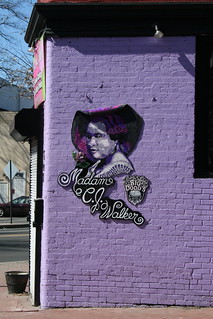
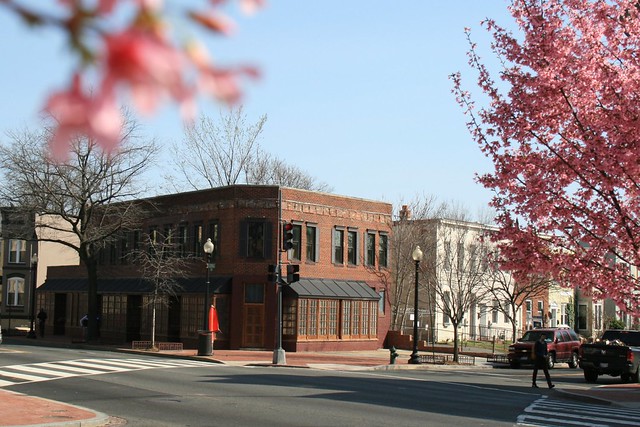







Recent Comments